Peter Struk fell asleep in the Lord
 Peter Struk, 94, of North Haven, passed away peacefully on Thursday, May 3, 2018 at the MidState Medical Center, Meriden with his family by his side. He was the beloved husband of 70 years to Melanie Horn Struk. Peter was born on June 3, 1923 in Brzezany, Village of Litiatyn, Region of Galizien, Ukraine and was the son of the late Jacob and Chyma Slywka Struk. Peter was a member of the Carpenters Union Local #79, and worked as an installation technician for Atlantic Floor Covering in New Haven until his retirement. He was an avid gardener and a member of St. Michael’s Ukrainian Church for many years. Father of Peter H. (Victoria) Struk and the late Anna E. Struk. Grandfather of Peter A. and Sarah Struk.
Peter Struk, 94, of North Haven, passed away peacefully on Thursday, May 3, 2018 at the MidState Medical Center, Meriden with his family by his side. He was the beloved husband of 70 years to Melanie Horn Struk. Peter was born on June 3, 1923 in Brzezany, Village of Litiatyn, Region of Galizien, Ukraine and was the son of the late Jacob and Chyma Slywka Struk. Peter was a member of the Carpenters Union Local #79, and worked as an installation technician for Atlantic Floor Covering in New Haven until his retirement. He was an avid gardener and a member of St. Michael’s Ukrainian Church for many years. Father of Peter H. (Victoria) Struk and the late Anna E. Struk. Grandfather of Peter A. and Sarah Struk.
Funeral services will be conducted in the North Haven Funeral Home, 36 Washington Avenue, Saturday morning at 10:30 a.m. with Father Iura Godenciuc. Family and friends may call from 9:00 a.m. until time of service. Interment will follow in All Saints Cemetery.
Prayers for God’s mercy on Peter and his eternal memory.
St John the Theologian
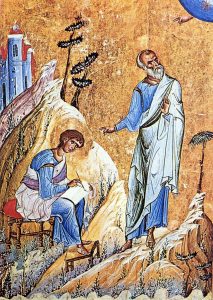 [Today] On May 8, we celebrate one of the two feasts of the Holy Apostle and Evangelist John, the brother of James. The other is on September 26, the day of his falling asleep. The fourth Gospel is attributed to John, and we can truly call it a “theo-logical,” for it witnesses most clearly to the mystery of the Incarnation, of the Word of God taking flesh in the womb of the Holy Theotokos for our salvation. It is the most sublime Gospel, and it gave John the title “Theologian.”
[Today] On May 8, we celebrate one of the two feasts of the Holy Apostle and Evangelist John, the brother of James. The other is on September 26, the day of his falling asleep. The fourth Gospel is attributed to John, and we can truly call it a “theo-logical,” for it witnesses most clearly to the mystery of the Incarnation, of the Word of God taking flesh in the womb of the Holy Theotokos for our salvation. It is the most sublime Gospel, and it gave John the title “Theologian.”
The Byzantine Church have this gospel a certain priority, and it is read in the most joyful and glorious time of the year, from Pascha to Pentecost. This Gospel is the very essence of the apostolic witness, through which we come to faith in Christ, as indeed John foretold, when the risen Jesus says to Thomas, “Blessed are those who have not seen and have believed,” (John 20:29) because we have all heard of the divinity of the Lord through the witness of the apostles. Some try to discredit Christian faith by pointing out that John’s Gospel was the last to be written, that the first Gospel, Mark, does not mention the divinity of Jesus, and that faith in the Incarnation is then a later Christian development. They do this by trying to fit the Gospels into a linear line, from the earliest to the latest, and it is easy to fall for this.
However, the development of the Gospels in not linear, but they arise from different communities, and each has a vision of Christ. Indeed, does not St. Mathew’s Gospel proclaim the truth of the Trinity, where the risen Jesus proclaims, “Go, therefore, and make disciples of all nations, baptizing them in the name of the Father, and of the Son, and of the holy Spirit” (Matthew 28:19). And – yes – there are many other witnesses to Jesus’ divinity in the epistles and apostolic writings. The letter to the Hebrews says, “[Jesus] who is the refulgence of [the Father’s] glory, the very imprint of his being, and who sustains all things by his mighty word” (Hebrews 1:3). Rejoice, therefore, in this holy season in the glory of the risen Christ so beautifully proclaimed by John. It is John who tells us, “God is light, and in him there is no darkness at all. If we say, “We have fellowship with him,” while we continue to walk in darkness, we lie and do not act in truth. But if we walk in the light as he is in the light, then we have fellowship with one another, and the blood of his Son Jesus cleanses us from all sin” (1 John 1:5-7).
May is Dedicated to the Mother of God
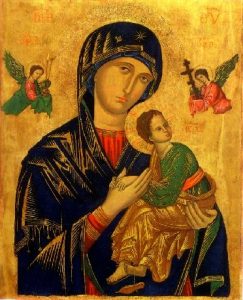 During the month of May our Ukrainian Greek Catholic Church honors the Mary the Mother of God in special prayer services as the akathist and moleben services. Mary was the humble servant of the Lord Who was always one with Her Son, our Lord God and Savior, Jesus Christ.
During the month of May our Ukrainian Greek Catholic Church honors the Mary the Mother of God in special prayer services as the akathist and moleben services. Mary was the humble servant of the Lord Who was always one with Her Son, our Lord God and Savior, Jesus Christ.
On the Cross the crucified gave John to His Mother and said: “This is Your Son!” At this moment we along with the beloved disciple John became spiritual children under the protection of His Mother Mary. Then turning to His disciple, Jesus said: “This is Your Mother!” At this moment not only John but all of us had a Spiritual Mother Who loved and cared for and about us. Mary is even now, today, our Intercessor always ready to help us, aid us in our times of need.
During the Moleben to the Mother of God we sing, pray and implore the Holy Theotokos to protect, save and keep us on the road leading to the Heavenly Kingdom saying:
“O Holy Mother of God, save us.” We refer to Mary as:
Ever-merciful Mother of God Mother of Eternal Love Mother of God’s grace Untainted Dove
Fragrant flower of incorruption
Our Intercessor before the Just Judge Comfort to those in sorrow
Refuge of sinners.
Indeed, Mary the Mother of God is ever there for us, ready to help and save those in need.”
Rev. D. George Worschak
Archeparchy of Philadelphia
Sunday of the Man Born Blind, Sixth Sunday of Easter
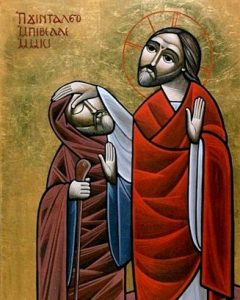 The story of the Man Born Blind is the third Sunday Gospel in Pascha about the mystery of baptism. This gospel is very clear, “Jesus spat on the ground and made clay with the saliva, and smeared the clay on his the blind man’s) eyes, and said to him, “Go wash in the Pool of Siloam” (which means Sent). So he went and washed, and came back able to see” (John 9:6-7). The clay represents the anointing we receive at baptism, making us “Anointed Ones,” (Christs, or Christians) and the washing represents the washing in the water of baptism. The blind man can then see, he is “enlightened,” the name the Church gives to baptism. Two observations: to be truly enlightened, we need humility.
The story of the Man Born Blind is the third Sunday Gospel in Pascha about the mystery of baptism. This gospel is very clear, “Jesus spat on the ground and made clay with the saliva, and smeared the clay on his the blind man’s) eyes, and said to him, “Go wash in the Pool of Siloam” (which means Sent). So he went and washed, and came back able to see” (John 9:6-7). The clay represents the anointing we receive at baptism, making us “Anointed Ones,” (Christs, or Christians) and the washing represents the washing in the water of baptism. The blind man can then see, he is “enlightened,” the name the Church gives to baptism. Two observations: to be truly enlightened, we need humility.
We need to know that only God can give us the vision we need. To do that, we cannot rely on our own “opinions,” we must hear his Word in the gospel, we must worship him with his people, we must be attentive to the voice of his shepherds in the teaching of the Church. If we believe only in ourselves, we risk condemnation, as Jesus told the Pharisees, “If you were blind, you would have no sin; but now you are saying, ‘We see,’ so your sin remains” (John 9:41). True knowledge comes only from the Holy Spirit, “But you have an anointing from the Holy One, and you know all things” (1 John 2:20). The second observation is that in these three weeks, our Lord calls to baptism the most unlikely people: a friendless man lying lame by a pool, a shameless woman with serial husbands, and a blind man about whom the disciples ask, “Rabbi, who sinned, this man or his parents, that he was born blind?” (John 9:2).
Jesus responds, “Neither he nor his parents sinned; it is so that the works of God might be made visible through him” (John 9:3). Thus separating the wrath of God from the judgment of sin. God truly hates evil, which brings death and failure, but he loves the sinner with infinite divine love. If we suffer because of our sins, it is because that is the “wages” of sin (Romans 6:23). We see in these three Sundays that God is merciful and wishes the salvation of all. He calls us all to enlightenment in baptism, so that we can live in the Holy Spirit.”
Patriarch Sviatoslav at 48
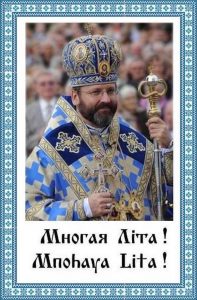
May the Lord grant Patriarch Sviatoslav many blessed years. His 48th birthday is today.
Divine Liturgy for the coming week
Christ is risen!
Sunday, 5/06/18 Sixth Sunday of Easter —Sunday of the Man Born Blind
9:00 +David Schwartz (1st Anniv.,) requested by Barbara Schwartz
10:30 a.m. For the people of the parish
Epistle: Acts 16:16-34
Gospel: John 9:1-38, Tone 5
Monday, 5/07/18 Holy Martyr Acacius
Tuesday, 5/08/18 Holy Apostle and Evangelization John the Beloved Disciples (the Theologian)
Wednesday, 5/09/18 Holy Apostle Simeon the Zealot
Thursday, 5/10/18 Feast of the Ascension of Our Lord, God, and Savior, Jesus Christ
9:00 a.m. For the people of the parish
7:00 p.m. +Pauline Kurylo (40 days, Pan.) requested by Margaret and Stuart Maybury
Friday, 5/11/18 Cyril and Methodius Apostles to the Slavs
Saturday, 5/12/18 Holy Epiphanius and Germanus
9:00 a.m. +Yaroslava Kalynec (40 days, Pan.) requested by the Sokhan Family
Sunday, 5/13/18 Seventh Sunday of Easter —Sunday of the Holy Fathers of the First Ecumenical Council
8:30 a.m. Moleben to the Mother of God
9:00 a.m. For the people of the parish
Epistle: Acts. 20:16-18; 28-38
Gospel: John 17:1-13, Tone 6
Parish announcements this week
Christ is risen!
WELCOME NEW PARISHIONERS! New parishioners are always welcomed in our parish. If someone wants to register with our parish please contact Fathe Iura Godenciuc at (203) 865-0388 or our financial secretary Natalia Chermak.
AFTER DIVINE LITURGY: Dear parishioners and guests, after each Divine Liturgy, coffee and hard rolls are available in the church hall.
VIGIL LIGHT: This week vigil light is given to God’s glory and is offered by Stuart and Margaret Maybury in memory of Helen Brezicki.
ASLEEP IN THE LORD: Please remember +Peter Struck in your prayers. ETERNAL MEMORY!
Our next Pyrohy Project Saturday will be May 19. Please place an order, and come and help. We have great fun. Let others know about our delicious Pyrohy. Call your order in by Tusday: Larissa Swartwout (203) 248-9767; Anna Smigelski (860) 302-2176; Anya Rohmer-Hanson (475) 655-2141.
You may also email your pyrohy (pierogi) order: orderpyrohynh@gmail.com
***please include your name, phone number and quantity of pyrohy (pierogi).More information can be read here: https://stmichaelukrainian.org/pierogies/
We have frozen pyrohy for sale while supplies last.
KOVBASA: The Knights of Columbus Parish Council will be making Fresh ¾ kovbasa and fried with 1 (one) pound of fresh cooked cabbage with a vegetable mix. A good meal for two people. The meals will cost $10.00. Please preorder to ensure that we make enough for everyone. Please call (203) 789-9554 only and leave a message with your order.
MOTHER’S DAY BREAKFAST: The parish Traditional Mother`s Day Breakfast will be held on May 13 after the 9:00 a.m. Divine Liturgy (note: only one (1) Divine Liturgy) in our church hall. All women of our parish are invited. The breakfast is hosted, sponsored and served by the Knights of Columbus parish council. We look forward to seeing you.
KNIGHTS OF COLUMBUS: The Knights of Columbus Blessed Metropolitan Andrey Sheptytsky Ukrainian Council will hold its next regular meeting on Monday, May 7, 2018 at 7:00 p.m. in the Church Hall. All men of parish are invited to attend to see what the Knights are all about and what they do and what you can do with them for your parish.
May prayer intention of Pope Francis
The May prayer intention of the Pope reads:
“That the lay faithful may fulfill their specific mission, by responding with creativity to the challenges that face the world today.”
Join in prayer with Pope Francis and many others around the world for this intention.
The Samaritan Woman
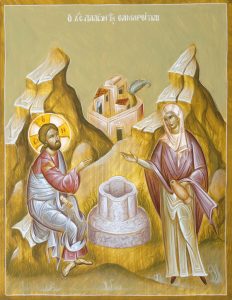 The theme of baptism continues in this Sunday’s Gospel, re-affirming that Pascha is a feast of resurrection and of baptism, being born into eternal life. The center of Jesus’ conversation with this unnamed woman (the Church later gave her the name Photine, the “enlightened woman”) is about water. They met at Jacob’s well, a place of great tradition, a sign and a promise of God’s love and mercy for his people. Jacob’s well provided the riches of water to a desert place, the sign that God would always provide for and bless his people. However, the encounter with the woman reveals something more: Jesus is the Messiah to come, he is greater than the Patriarch Jacob. The water of Jacob’s well is only for this world, Jesus would give “the water that would become a spring of water welling up to eternal life” (John 4:14). This clearly refers to our baptisms, as it comes immediately after the comparison of Jesus with John the Baptist, and the baptisms done by Jesus’ disciples. We renew our baptism every time we receive Communion, and they are for life, for eternal life, from God, the giver of life.
The theme of baptism continues in this Sunday’s Gospel, re-affirming that Pascha is a feast of resurrection and of baptism, being born into eternal life. The center of Jesus’ conversation with this unnamed woman (the Church later gave her the name Photine, the “enlightened woman”) is about water. They met at Jacob’s well, a place of great tradition, a sign and a promise of God’s love and mercy for his people. Jacob’s well provided the riches of water to a desert place, the sign that God would always provide for and bless his people. However, the encounter with the woman reveals something more: Jesus is the Messiah to come, he is greater than the Patriarch Jacob. The water of Jacob’s well is only for this world, Jesus would give “the water that would become a spring of water welling up to eternal life” (John 4:14). This clearly refers to our baptisms, as it comes immediately after the comparison of Jesus with John the Baptist, and the baptisms done by Jesus’ disciples. We renew our baptism every time we receive Communion, and they are for life, for eternal life, from God, the giver of life.
A couple of observations: as for Nathaniel, Jesus signs his ministry with intimate knowledge of the people he meets. He sees Nathaniel under the fig tree, and he tells the woman about her five husbands. In both cases, they become his disciple because of his knowledge of him. This is a theme of John’s Gospel, the shepherd knows his sheep and his sheep know him. Second, it should be to our wonder that Jesus always comes to the most underprivileged. To whom does he reveal the mystery of eternal life in baptism: to the paralytic who had no friends, to the woman who had led a shameful life, and came to the well at noon who no one else would be there, and to the blind man suspected of sin because of his blindness. And the disciples marvel that Jesus speaks to a woman! Not just any woman, but a heretical, decadent Samaritan woman! Are we humble enough to accept Jesus as our Messiah?
Meditation by Archpriest David Petras